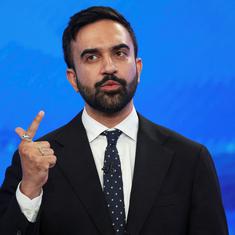Rajasthan is only following other precedents across India.
It is, for instance, a shade away from Haryana, which in January decided to include the Bhagwad Gita not in libraries but in the school curriculum from the fifth to 12th standard.
“Max Mueller had once got copies of the Vedas in Germany and placing all the four Vedas on his head, he had danced for 30 minutes,” said Haryana education minister Ram Bilas Sharma at a press conference justifying the move. “He was overjoyed to have got such wealth of knowledge from the Vedas.”
Who reads books anyway?
The move might end as a dud. Just having a book in a library is no guarantee that children will use it. Education experts point out that even having a library in schools is no guarantee that books are being read.
Ironically, from 2010 to 2014, the number of schools in Rajasthan with libraries actually went up. According to the Annual Status of Education Report conducted by Pratham Foundation in 2014, the number of institutions without reading rooms fell from 36.3% to 12.2%.

However, the real story emerges when you look at the number of students who were found to be using the libraries on the day that the survey team visited. There, Rajasthan ranks 13th in the list of 27 states Pratham surveyed for libraries that had children using books when the team visited.

As the report is at pains to make clear, this is not a representative sample, particularly since they visited each school only on one day. Yet more than half of all libraries it visited had no children using books in them.
Saffronisation in the school
Since his induction in October 2014, Devnani been making a strong push to strengthen its primary education system, starting with hiring more teachers and opening model schools that will deliver a quality of education similar to that in Kendriya Vidyalayas.
But even as Rajasthan moves to strengthen its primary education, the education ministry under Devnani has also consistently made headlines for organising its education along Hindutva principles.
Take just 2015.
At the end of January, the ministry issued an order that children in all model schools in the state would have to compulsorily practice surya namaskar and meditation before class. These schools, of which 66 of a planned 186 have been opened, are special schools that aim to provide a quality of education similar to that of Kendriya Vidyalayas at the village level.
Then in April, the minister announced that in the coming academic year, Mughal emperor Akbar would lose his nomenclature of “the great” in school textbooks. This instead would be given to Maharana Pratap, Akbar’s contemporary and noted rival. Other changes involved giving greater importance to Indian scientists Aryabhatta and Bhaskaracharya than to the theories of Newton and Pythagoras.
Attention moved to higher education in September, when the government announced that it would hold a state-wide blood donation drive in colleges across the state. All staff in private and government colleges were instructed to be on duty to supervise donations. This happened to coincide with Eid ul Zuha, a national holiday. The Rajasthan High Court dismissed a public interest litigation challenging the order, citing blood donation as a “noble cause”.
October brought more changes to school textbooks, when the secondary education board reviewing them mulled bringing in Vedic mathematics and yoga into the curriculum and reducing the number of foreign authors in textbooks, in accordance with a Devnani guideline that suggested more local content.










